General
Presidential Initiative enhances Mak Science and Tech Impact
Published
11 years agoon

Thanks to support from the Presidential Initiative for Science and Technology, Makerere University has since 2010/11 undertaken several innovative projects under; the College of Engineering, Design Art and Technology (CEDAT), the College of Agricultural and Environmental Sciences (CAES) and the College of Veterinary Medicine, Animal Resources & Biosecurity (CoVAB).
The initiative supports the university’s main priorities in the area of research and innovation as defined in light of scientific challenges, and the role of the universities as change agents in economic development of the country. On 30th and 31st July 2014, hundreds flocked to Makerere University to witness and several advancements made by the Makerere University Staff and Students through Science and Technological Innovations
This was during the Presidential Initiative for Science and Technology Stakeholders’ Forum organized by Makerere University to engage Government, Development Partners, Science, and Technology regulatory bodies, Policymakers and Academicians to take part in stock of the progress thus far and discuss the way forward. At the Forum held on 30th July 2014 in the Makerere University Main Hall under the theme: “The Presidential Initiative at Makerere University, an engine for realizing Vision 2040 through research and innovation” participants took stock of the University’s contribution towards the attainment of the Uganda Vision 2040.
The Presidential Initiative on Science and Technology was purposefully started to enhance the development of science and research in the country, working through various bodies including the Uganda Industrial Research Institute (UIRI), the Uganda National Council of Science and Technology (UNCST) and other various research stations across the country. The Presidential Initiative has continued to benefit the university by contributing much to its core functions and supporting the two overriding principles of;
- A research-driven university where research and teaching and learning are mutually reinforcing; and
- Knowledge transfer partnership and networking where knowledge production and transfer is two way traffic between the university and the public and private sectors.
According to the Vice Chancellor Prof. John Ddumba-Ssentamu, Science and Technology has created a platform for the university to contribute to national development through knowledge generation, innovations and transfer.
“A number of successes have been realized in all projects under the initiative and students under the technology innovations have produced exciting prototypes with potential for rural community production transformation among other benefits,” said the Vice Chancellor.
Through his speech read by the Vice Chairperson-Makerere University Council, Hon. Irene Ovonji-Odida, the Chancellor, Prof. George Mondo Kagonyera congratulated Makerere University upon the continued contribution to the development of science and technology in the Uganda.
“The progress made in this great institution signals bright future prospects for national development. I encourage all young innovators to continue looking at all developments with an optimistic and broad view so as to benefit both national and international audiences,” Prof. Kagonyera advised.
In her speech read by the Commissioner for Higher Education Mrs. Elizabeth Gabona, the Minister of Education and Sports, Hon. Jessica Alupo acknowledged the impact of Makerere University’s innovations in transforming the lives of Ugandans.
“There has been a need to demonstrate the impact of science and technology on national development, and I am pleased that this has been highlighted by Makerere University. I hope that five years from now with continued support from the Presidential Initiative, there will be even more valuable research products to showcase as has been demonstrated at the exhibition. I thank Makerere University for putting these funds to proper use,” said Mrs. Gabona on behalf of the Minister.
While taking the participants through the evolution of science and technology at Makerere University, the Deputy Vice Chancellor in charge of Finance and Administration (DVCFA) Prof. Barnabas Nawangwe, appreciated the financial support from the government through the initiative. He noted that prior to the Presidential Initiative Makerere University had engaged in several innovations but encountered a great challenge of inadequate funds, as required to transform these projects into market-ready products.
“I am happy to note that the Government of Uganda through the Ministry of Education and Sports and the Ministry of Finance, Planning and Economic Development has directed a sum of UGX 25 Billion to be spread over a five year period for innovations, with UGX 5 Billion committed in every Financial Year Starting July 2010. Therefore we have been receiving this money every financial year,” said Prof. Nawangwe.
During his presentation on Boosting Technology, Education and Innovation, the Principal, College of Engineering, Design, Art and Technology (CEDAT), Dr. Henry Alinaitwe, said the College had so far produced eleven technical innovations including the rehabilitation and modernization of laboratories. These projects focus on the increasing relevance and practice experience of graduates; improving the University’s relationship with all sectors of industries as well as the private sector; development of online laboratories, and utilization of indigenous materials in the production of home-based products.
“The Presidential Initiative supports three components at this college namely; modernization of laboratory infrastructure, industrial training and innovative projects aimed at increasing and retaining a pool of highly trained professionals, and developing business incubation facilities to support commercialization of staff and students ideas,” said the Principal.
Speaking on behalf of the technical team of the Kiira EV project, Prof. Sandy Stevens Tickodri Togboa, Principal Investigator–Centre for Research in Transportation Technologies (CRTT), shared that the Centre has a vision to take the Kiira EV project forward and establish the first original equipment manufacturing plant in Uganda and East Africa.
“Our ambitions are to commercialize the Kiira EV and as such we are concurrently working on developing the concept plan as well as a master plan of the facility where the car is going to be made. I am grateful to announce that through the Presidential Initiative, the Government has donated 100 acres of land located in the Jinja industrial and Business Park on which the Kiira Motors Cooperation complex shall be built,” said Prof. Tickodri Togboa.
The Food Technology and Business Incubation Centre (FTBIC) is the first University-based technology and business incubator in the East and Central Africa. In his presentation, Prof. William Kyamuhangire from the School of Food Technology, Nutrition and Bioengineering, College of Agricultural and Environmental Science (CAES), took note of the strides made by the incubator in transforming the lives of Student entrepreneurs.
“FTBIC offers services like processing infrastructure and space, research and product Development support, Technology transfer, Enterprise Development, Outreach and Skills Development. As a result 15 companies have been established and 20 brands registered with over 30 products on market,” Prof. Kyamuhangire said.
The transformation of a country from a peasantry to a middle-class economy may at times call for a radical shift in training. In this regard, the Principal, College of Veterinary Medicine Animal Research and Biosecurity (CoVAB) Prof. David Kabasa introduced the Skills, Production, Entrepreneurship Development leadership and Academic accreditation (SPEDA) model, through which individuals, groups, students, households or communities are enrolled, nurtured and moulded to fit productively into society.
Prof. Kabasa said, SPEDA is a specific university-mediated scheme developed in support of national efforts, which is driving community extension, mass skilling and mass creation of business, wealth and employment opportunities through summative learning, skilling and enterprising and technology exchange to appropriate prosperity for all.
“Therefore as a College we are implementing this model of higher education to promote skills for production, employment and development in the animal industry among post-secondary school leavers through academic–community–public–private partnerships, in order to translate science and education into livelihoods and inclusive economic growth,” he said.
Speaking on behalf of the Private Sector, Prof. Maggie Kigozi, thanked Makerere University for all the wonderful research and innovations produced thus far. She however advised the university to aggressively promote these great innovations among the public and private sectors
“I would like to encourage Makerere University to try and market their products among her stakeholders, so that we come to know of their existence. So many things are produced here but we do not know about them! Please endeavour to provide more information and data about the products made,” she said.
The Forum ran alongside a two-day, (30th – 31st July 2014) exhibition at the Freedom Square. Students from three colleges; the College of Engineering, Design Art and Technology (CEDAT), the College of Agricultural and Environmental Sciences (CAES), specifically the School of Food Technology, Nutrition and Bioengineering and the College of Veterinary Medicine, Animal Resources and Biosecurity (CoVAB) showcased various Science and Technological innovations. These included the Kiira EV car, solar pumps, aerial drones, a straw bale making machine, dairy products honey products, liquid detergents made from animal fats, maize mills, sickle cell testing equipment, malaria treatment kit, rain water harvesting technology, mobile antenatal care, electricity from biomass, Nevirapine medicine modification for prevention from mother to child transmission of HIV, among others.
Please see Downloads for detailed presentations
Article by Prossy Nabatte, Intern, Public Relations Office
You may like
General
Makerere University Hosts Ambassador Judyth Nsababera for Strategic Dialogue Advancing Uganda–China Engagement
Published
10 hours agoon
November 26, 2025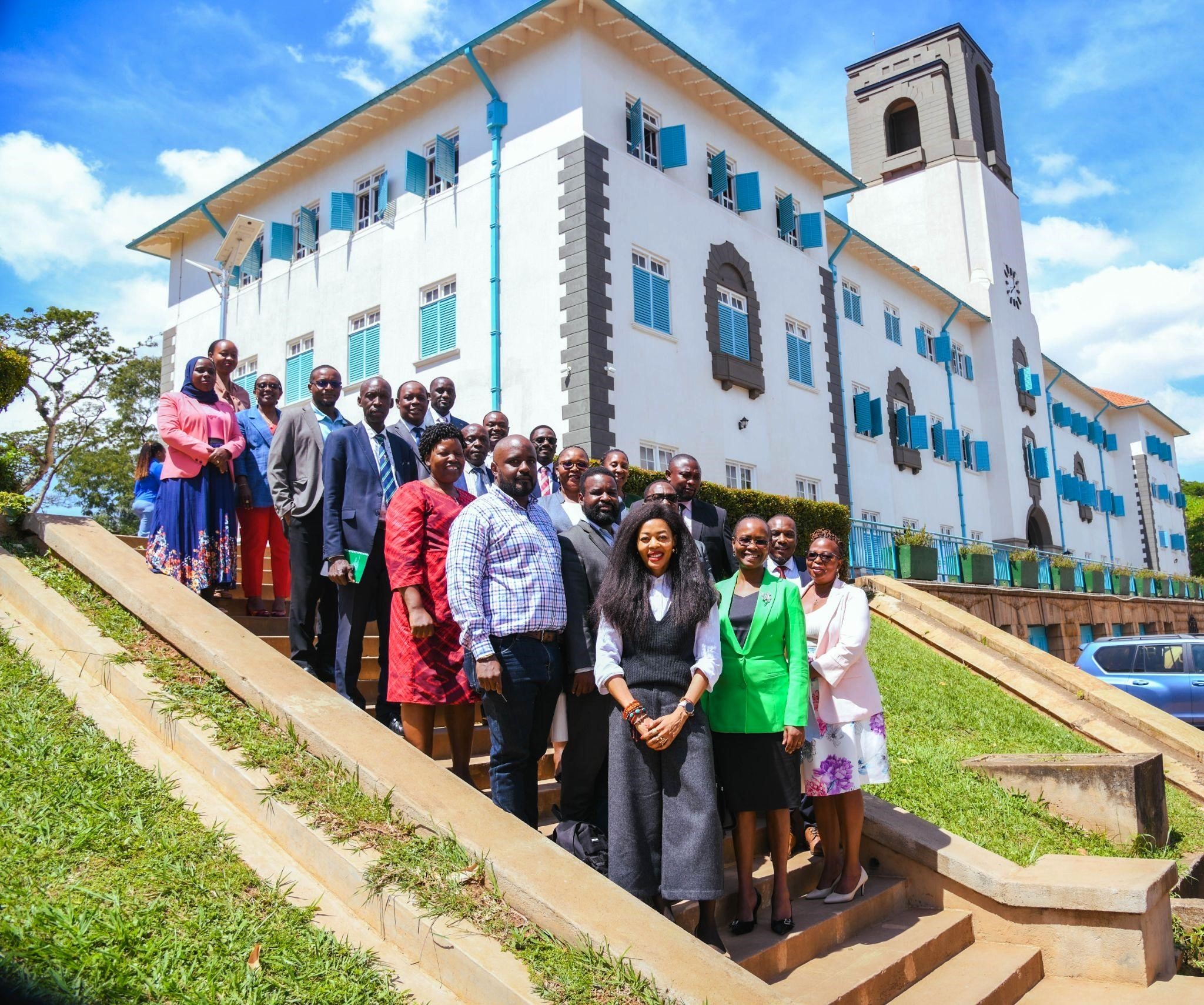
Makerere University, in a Top Management meeting chaired by Prof. Sarah Ssali, the Acting Vice Chancellor, hosted an important engagement with Uganda’s Consul General to China, Amb. Judyth Nsababera. The meeting brought together university leaders, innovators, students, and heads of departments and Units. Discussions centred on innovation, commercialisation, branding, and international collaboration, particularly with China, while also showcasing Makerere’s growing role as a national and continental engine for research, entrepreneurship, and transformative ideas.
This dialogue came at a symbolic moment as Makerere recently concluded its centenary celebrations, positioning the institution not just as a historical leader in higher education but as a forward-looking university ready to shape Africa’s place in global knowledge, trade, and innovation ecosystems.
Showcasing Innovation and Student Enterprise
The engagement highlighted the work of the University Centre for Entrepreneurship and Innovation, which champions student-led innovations, particularly from the Makerere Coffee Club. The Coffee Club, a student-led innovation focused on value addition to coffee, served their products during the top management meeting, demonstrating how academic training is being translated into real, market-ready solutions.
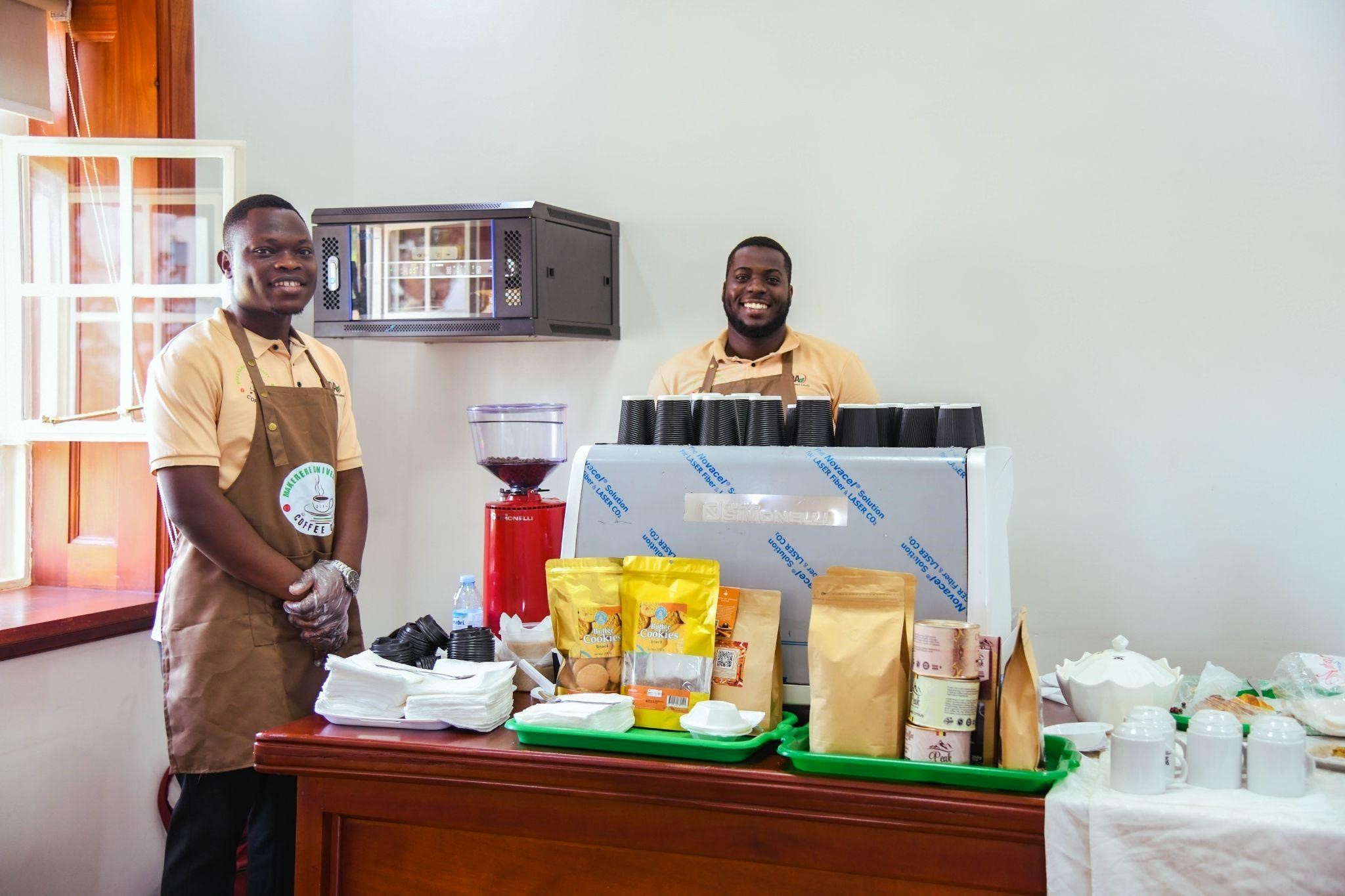
Prof. Sarah Ssali emphasized the importance of ensuring that innovation does not remain confined to laboratories or “junk” backrooms, but progresses into structured systems that support commercialization, intellectual property (IP) protection, and market penetration.
The presence of officers from the University Intellectual Property Office reinforced the need for stronger collaboration to safeguard student innovations and maximize their economic potential.
The university’s investment in barista training and coffee branding was cited as a model of practical, inclusive innovation, with training open not only to students but also to wider communities. This was further strengthened by the role of the Uganda Coffee Development Authority (UCDA), which donated a professional coffee machine to support student training and practical exposure within the Makerere Coffee Club, reinforcing the importance of national institutions in strengthening the coffee value chain.
The meeting highlighted the establishment of a Coffee Museum at the University, led by the School of Food Science, Nutrition and Bioengineering. The Museum will be the first of its kind in Uganda. Amb. Judyth Nsababero highlighted the fact that it would serve as an intellectual, cultural, and societal tool for preserving and elevating Uganda’s coffee heritage on the world stage. Beyond preservation, the museum was framed as a strategic branding platform that would connect Uganda’s coffee narrative to global audiences and align it with China’s fast-growing coffee consumption culture, positioning it as both a knowledge centre and a symbol of national identity.
Education, Language, and Capacity Building
The strategic engagement also underscored the need to strengthen the Chinese language teaching capacity at Makerere University.
Strong emphasis was placed on Chinese language acquisition as a tool for trade, diplomacy, and innovation. Prof. Mugaga Muwanga stressed that while Uganda remains focused on local languages, there is an urgent need to empower lecturers to become Chinese-trained educationists who can cascade this knowledge across the education system. Strong emphasis was placed on Chinese language acquisition as a tool for trade, diplomacy, and innovation. Prof. Mugaga Muwanga, Principal, CEES, Makerere University, underscored this need, stating:
“The language Chinese is becoming key in world trade. As educationists, we are still focused on teaching Ugandan languages. We need to be empowered to train Chinese-trained educationists. This value chain has to start with capacity building of the lecturers, who will teach the future teachers to roll out the language across various levels of education.”
His remarks reinforced the urgency of investing in structured capacity building for lecturers as the foundation for sustainable introduction of Chinese language education across Uganda’s learning system.
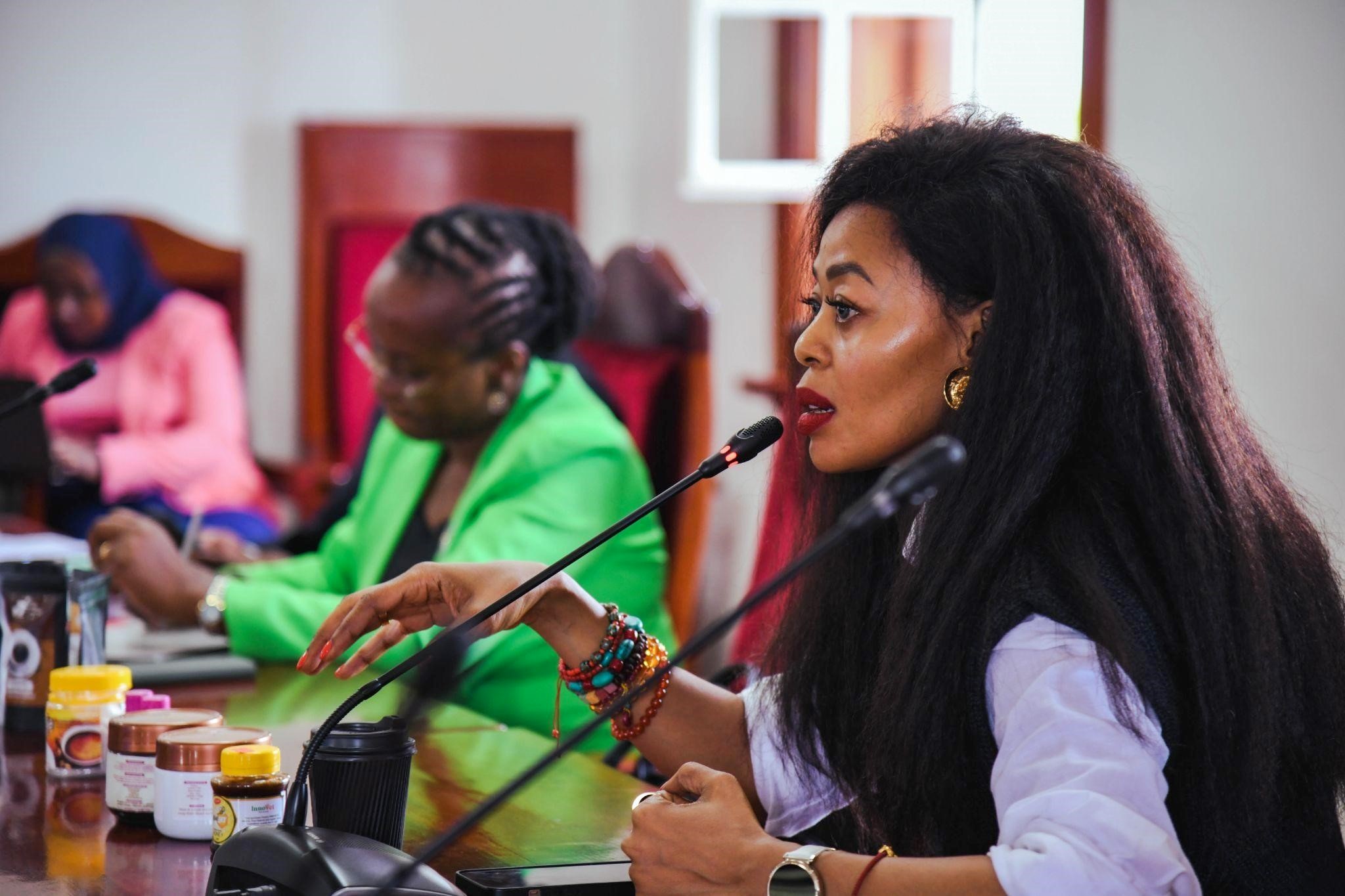
The Ambassador committed to supporting scholarships and training opportunities for staff and academicians, particularly at CEES, to build capacity in Chinese language and culture. This initiative will equip beneficiaries with the skills needed to teach Chinese and strengthen meaningful international engagement in key fields such as law, medicine, business, and technology.
Dr. Zahara Nampewo highlighted growing interest by Chinese students in studying law at Makerere University, opening opportunities for reciprocal exchange and joint legal training. The Ambassador also proposed training Ugandan lawyers to better understand the Chinese legal system to strengthen negotiation and international business competence.
Broader Strategic Partnerships
Ambassador Judyth Nsababera highlighted several strategic partnership opportunities aimed at strengthening Makerere University’s global engagement and innovation capacity. These include collaboration with UNDP, which is already supporting commercialisation, skilling, and capacity building, including benchmarking Ugandan enterprises with Chinese packaging companies to enhance product competitiveness and scale production.
She also referenced Yunnan University (China’s coffee province) as a critical academic partner, citing its pioneering coffee degree programme, integrated innovation model, and student-led branding system as a benchmark Makerere could learn from and engage with in developing its own coffee ecosystem and museum.
Additionally, the Ambassador pointed to Koti Coffee (China’s fastest-growing coffee chain) as a potential industry partner, noting its rapid expansion and influence in the global coffee market as an entry point for promoting Ugandan coffee and strengthening market linkages. She further encouraged exploration of collaboration with corporate entities such as Huawei, particularly in areas of student mobility, technological advancement, and academia-industry integration.
Together, these proposed partnerships represent strategic avenues for academic exchange, innovation transfer, market access, and international positioning, laying the groundwork for sustainable and mutually beneficial engagement between Makerere University and global institutions.
Strategic Engagement as a Pathway to Sustainable Partnerships
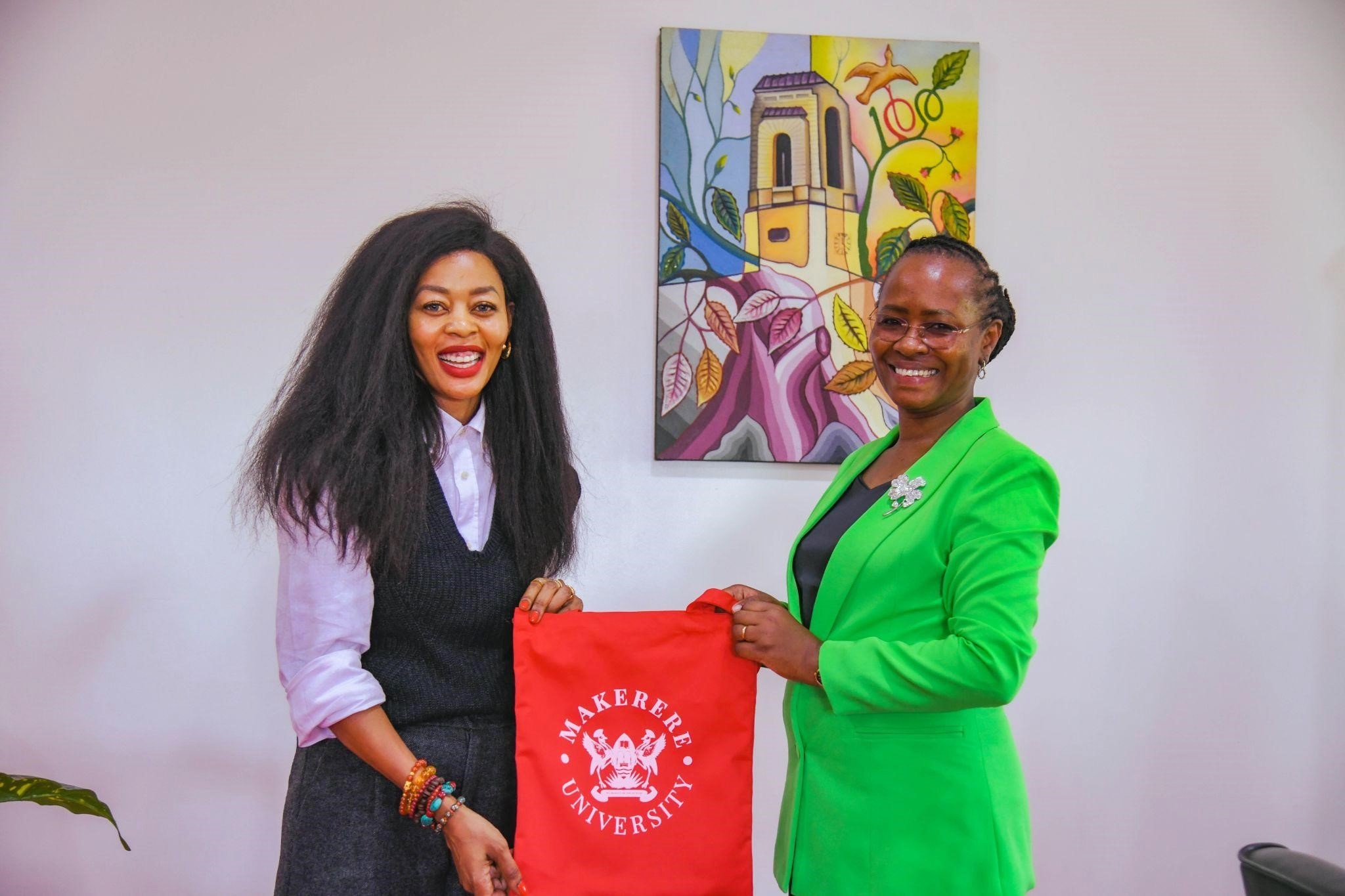
The engagement between Makerere University and Ambassador Judyth Nsababera marked a defining moment in advancing strategic dialogue and relationship-building as a foundation for future Uganda–China academic and innovation cooperation. It reinforced the need for structured branding systems, scalable production, commercialisation pathways, language capacity building, and strong university-industry linkages.
As Makerere continues to evolve as a national engine of innovation, research, and thought leadership, this visit provided a clear roadmap for how the institution can assert its rightful place within China’s expanding academic, technological, and economic ecosystem, transforming Uganda’s heritage, creativity, and intellectual capital into global influence.
Caroline Kainomugisha is the Alumni and Partnerships Communications Officer, Advancement Office, Makerere University.
General
Makerere Students share experiences, connections and inspiration at inaugural For Youth, By Youth Conference in Turkey
Published
1 day agoon
November 25, 2025By
Mak Editor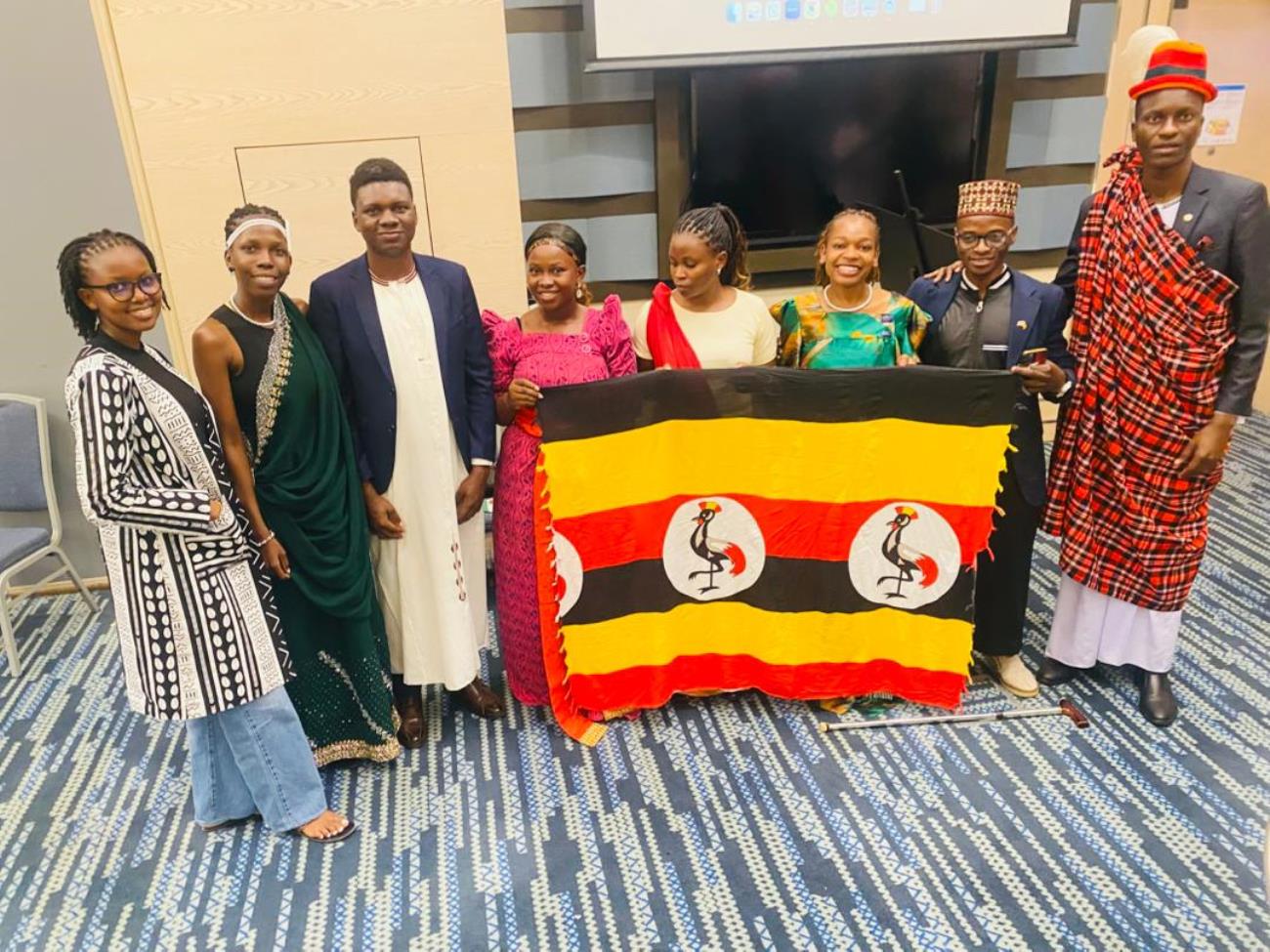
On 16 November 2025, six students from Makerere University travelled to Turkey to join 69 peers from other prestigious universities for the inaugural For Youth, By Youth Conference on Conscious Leadership and Global Solidarity. The two-day conference was organised by the Talloires Network of Engaged Universities, in collaboration with paNhari and Sabancı University, and supported by the Mastercard Foundation.
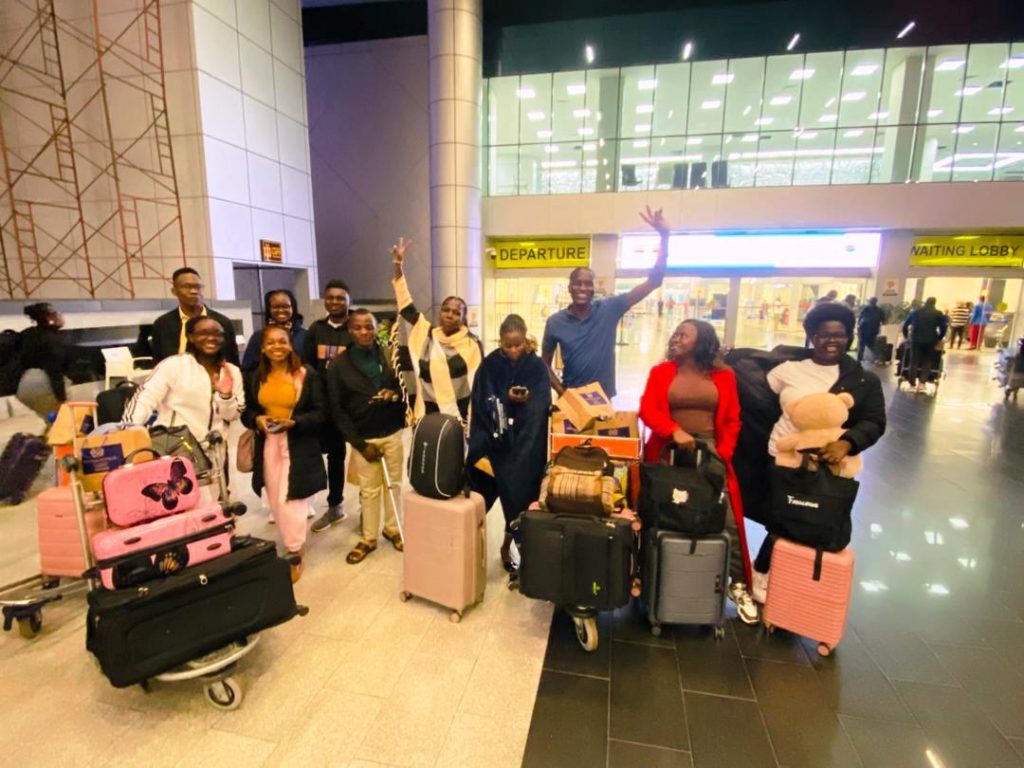
During the Conference, held between 17 and 18 November, students participated in a variety of activities, including panel discussions, presentations, and the drafting of the For Youth, By Youth Movement Charter and the Talloires Declaration, the first of its kind to be drafted entirely by students. For many of the students, this experience was the beginning of their journey of global impact and a rare platform to openly share their experiences, ideas and aspirations.
Student reflections after the conference
Naomi Ayebale, a Master of Science in Clinical Psychology student at Makerere University, who took part in the panel discussion “Struggles for Justice and Peace in Our World,” shared: “Attending this event felt like stepping into a space where every voice truly mattered. It was a reminder that no single, beautifully crafted story can ever capture what all our stories hold when woven together. Everyone came with their own truth, their own lens, and their own hope, and somehow it all fit.
“Being part of this movement fills me with a sense of joy, not just because of the cause itself, but because I get to stand alongside people who are not only demanding change but actively working to build it,” she said. “It’s energizing, but it also comes with a deep sense of responsibility. For me, being part of the For Youth, By Youth movement isn’t about how long I’ve lived; it’s about the experiences I carry and the problems I’ve witnessed firsthand. Those experiences have taught me not only what needs to change, but also how meaningful that change can be.”
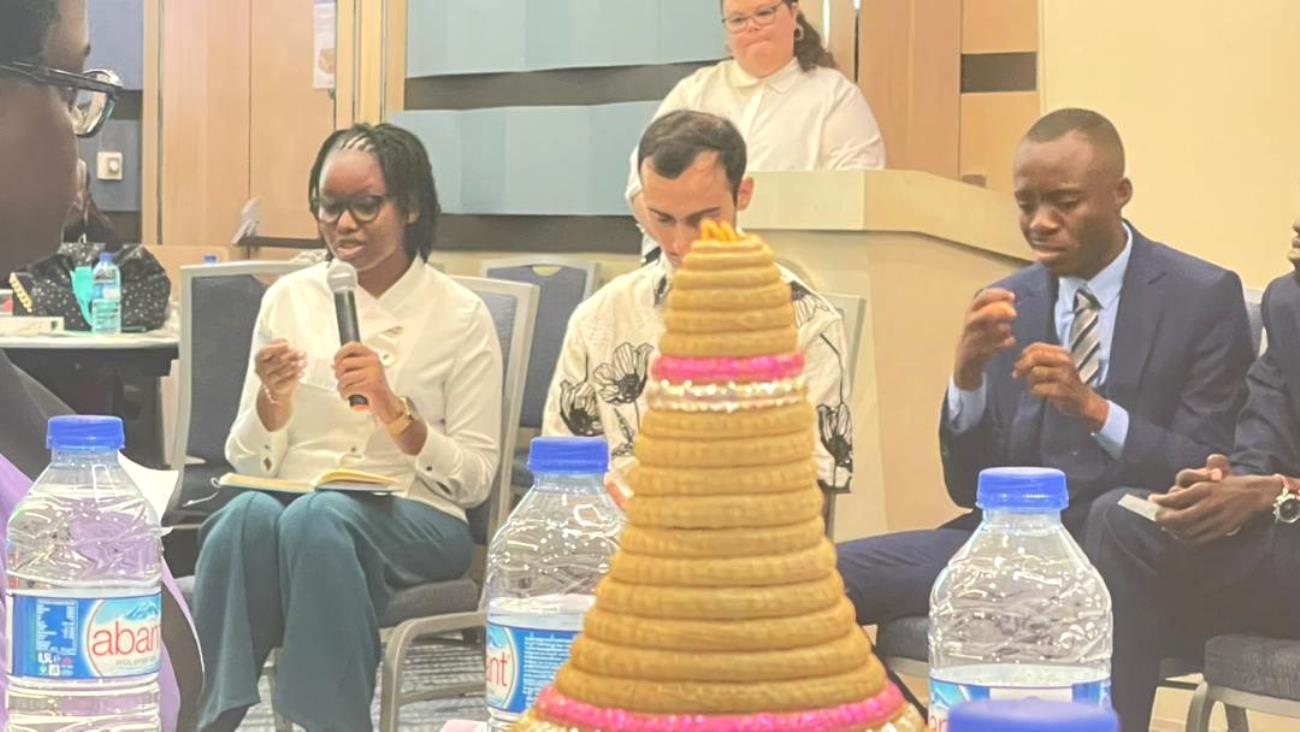
Tyobo Harriet Yake, a final-year student at Makerere University pursuing a BSc in Biomedical Engineering and one of the inaugural cohort participants of the For Youth, By Youth movement, remarked: “For me, it was amazing and exciting to meet young people from different countries who share similar beliefs and ambitions,’ she said. “Conversations like these created a safe space where victims of injustice could share their stories openly. It inspired me to return to my community and continue doing whatever I can, however small, to make life better for those facing similar circumstances.
“I felt a strong sense of unity, and the words of the famous song ‘Different colors, one people’ truly came to life. I loved trying foods I couldn’t even pronounce but absolutely enjoyed. It was a full package of rich experiences in just a few days” she added.
“As I move forward, I’m reminded of John F. Kennedy’s quote ‘leadership and learning are inseparable.’ A leader learns through listening to the loud and silent voices of the community. It’s this conscious leadership that sparks transformation and fuels collective growth. This is the leadership I embrace in this journey” Harriet concluded.
Sandrah Naikambo, a third-year student pursuing a Bachelor of Information Systems and Technology, shared her reflections:
“From my experience at the conference and the movement in general, I learned that change isn’t just spoken about—it’s built. I witnessed young people who weren’t waiting for permission but using their own lived experiences to create real solutions. In that space, every voice mattered and every story had room to breathe. I walked away feeling seen, inspired, and connected with a purpose bigger than myself. This experience showed me that the youth are not the future, they are the present!”
Namwase Rinah Marion, a final year student at Makerere University pursuing a Bachelor of Social Work and Social Administration, and a former Guild Minister for Students with Disabilities in the 89th Guild remarked:
“It was exciting to meet young leaders from across the world who had ambitions towards change in their respective communities and universities,” she said. “The international conference did not only expose me to fellow determined leaders but also inspired me to push hard for success as I got to know there is nothing without us. We are the leaders of tomorrow, and the program entrusted us; so, we are the change makers of today and tomorrow. Young leaders for a better world.”
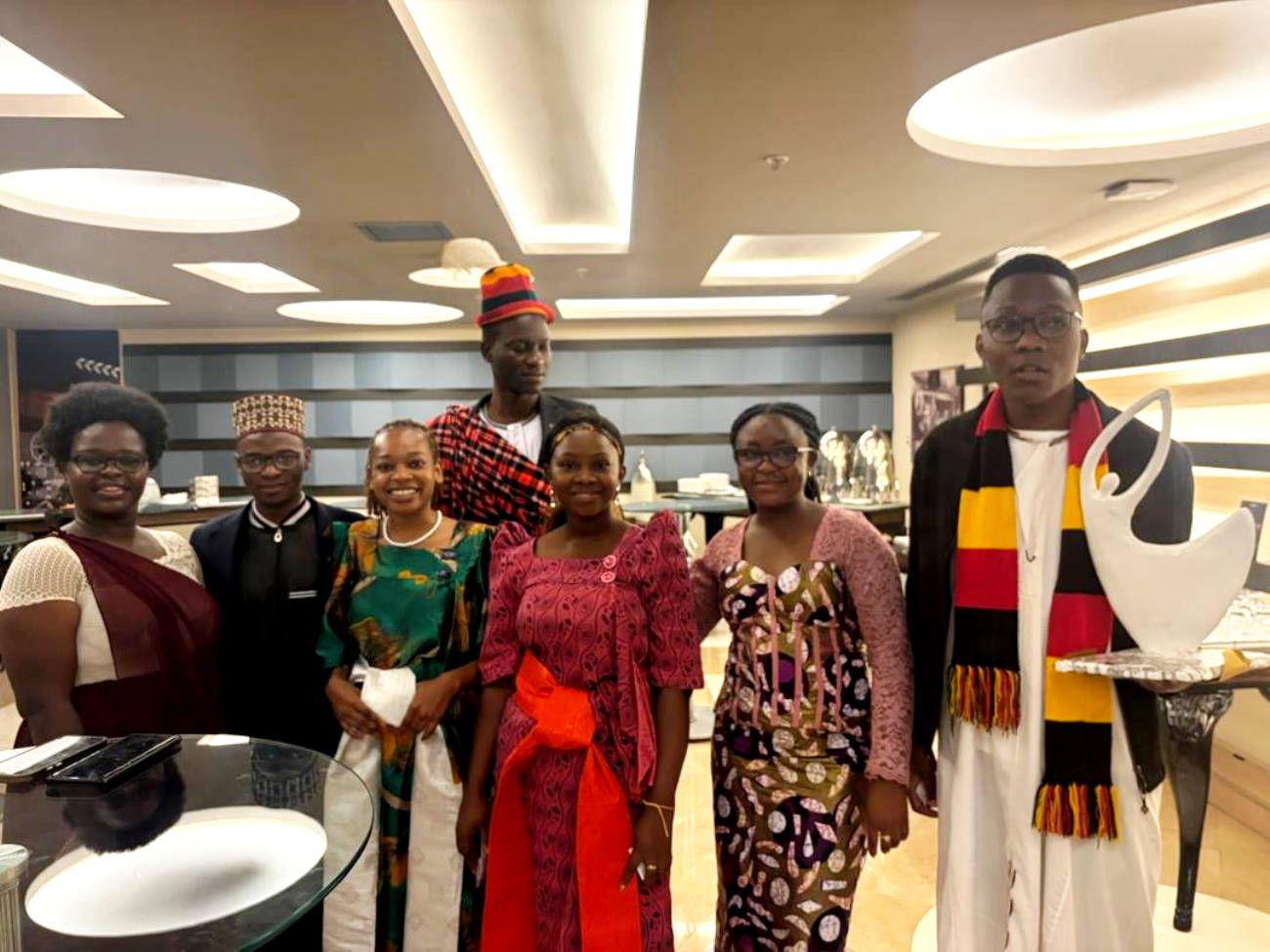
The For Youth, By Youth movement was born from the vision of 36 Next Generation Leaders from 18 countries, including Makerere’s Harunah Damba and Patrovas Okidi, who, at the height of the COVID-19 pandemic, worked together to stitch the threads that would later give rise to the movement. They organized local community and campus events, engaging directly with young people, communities, and universities to identify the issues that mattered most to them.
In recognition of the university’s support and as a gesture to strengthen ties with university leadership, Harunah and Patrovas presented a plaque to Vice Chancellor Professor Barnabas Nawangwe, honouring Makerere University’s support for the Next Generation Leaders Program in December 2023.
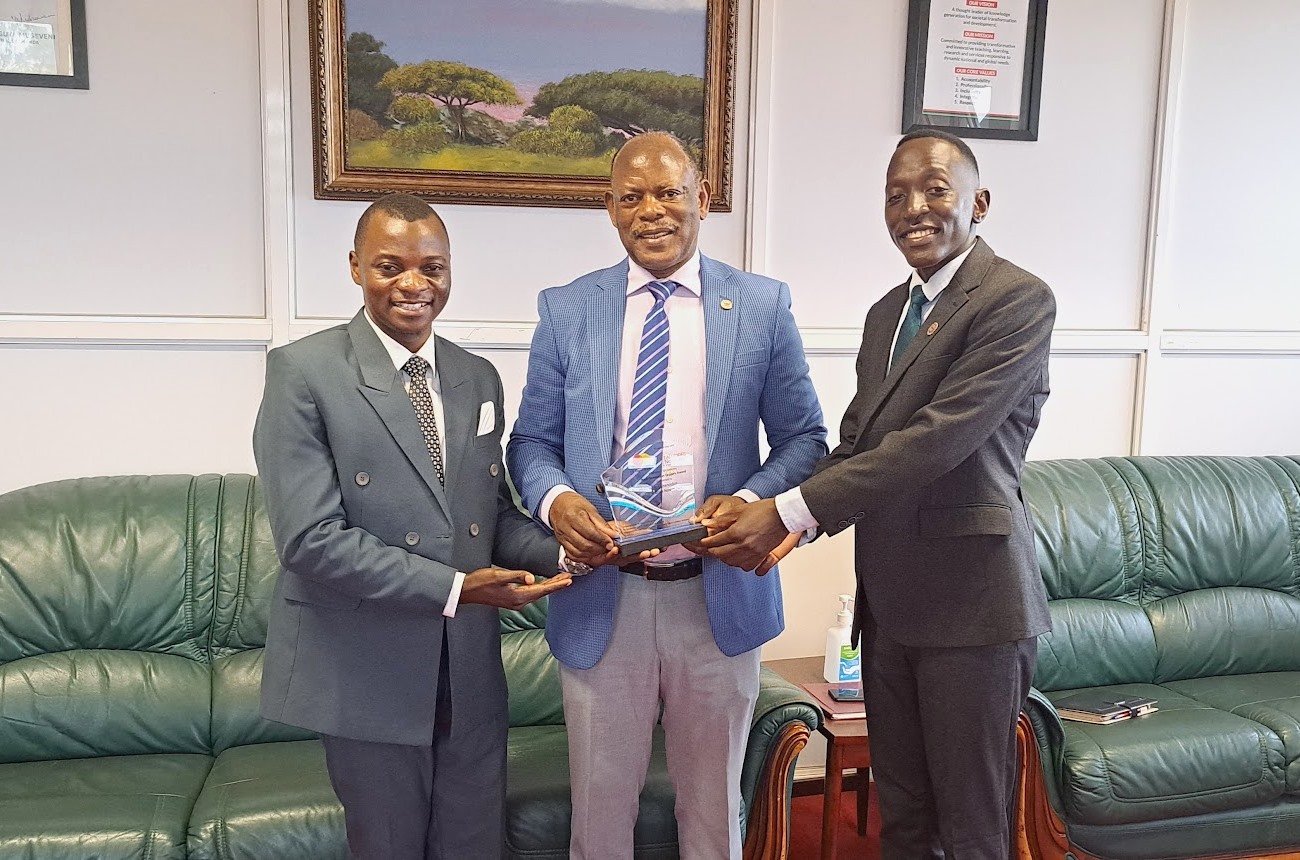
Reflecting on their experience, Harunah, now a Makerere University alumnus, said: “It was such an honour for me to be part of the inaugural For Youth, By Youth conference. Seeing the fruits of our hard work finally come to life is something that sits very close to my heart. I can’t think of any work that would be more rewarding, more encouraging, or more inspiring than this.”
Patrovas, a Master of Science in Bioinformatics student at Makerere University, said: “The For Youth, By Youth movement is a testament of what young people can do when organised, from its birth to the very first international conference, it has been led by youth and for the youth who are guided by values of respect, humility, kindness, impact, solidarity, hope, levity, collaboration, and inclusivity. The conference echoed one clear message I would love to pass on to everyone out there, our movement is a values-based civic infrastructure of engaged universities and a nimble network of virtual spaces. To solve multiple intersecting crises, education must evolve into regenerative, living systems rooted in community. Universities should represent all members of society, and be able to speak truth to power, and to centre empathy as the heart of learning and belonging. Youth must be co-creators in solving global challenges, while universities steward safe spaces for critical discourse and shared learning.”
He added “Echoing the voice of Lorlene Hoyt and others: For Youth, By Youth… it’s not a program — it’s a movement. Look out 2045, we’re just getting started. – this is our sense of belonging.”
General
In Honor of the Life and Legacy of Mr. Francis Seletze Ngabirano-A Steady Hand through the Storms
Published
2 days agoon
November 25, 2025
When the history of public health training in Uganda is told — honestly, fully, and with the respect it deserves, the name Francis Seletze Ngabirano must stand at the center of that story. For 32 years, he was one of the most consistent figures at Makerere’s Department of Preventive Medicine, now the Institute (and later, School) of Public Health. Through leadership transitions, political upheavals, and moments when the institution teetered on collapse, he carried with him a quiet, steady force, one that helped keep the wheels turning and the vision alive.
Thirteen years after Makerere University was established, a boy was born in the rolling hills of Kigezi on 18 November 1935. His parents named him Francis Seletze Ngabirano. At that time, no one could have imagined that this young boy would one day dedicate his life to Uganda’s premier and oldest university. Guided by his parents’ commitment to discipline and service, Francis began school in 1945 at the age of ten. He completed his primary education in 1950 before proceeding to secondary school from 1951 to 1956.
By the late 1950s, long before the Makerere University Institute of Public Health was conceived, he was already doing the work that would define his life, administration in health settings. From Kilembe Mines Hospital, where he managed medical records and supervised clerical staff from 1957 to 1960, to the Ross Institute of Tropical Hygiene (East Africa Branch) from 1961 to 1963, where he served as Technical Assistant to the Principal Officer and helped set up regional health research operations across Kenya, Uganda, Tanzania, Malawi, and Zambia, his career was expanding beyond borders. Even as a young man, he had already become someone institutions could trust.
During this same period, he also served as Assistant Chief Health Educator with the African Medical and Research Foundation (AMREF), then a fast-growing regional health organization headquartered in Nairobi. His work took him directly into communities, organizing health education courses in schools and villages, gathering and analysing sickness data from local industries, and supervising the support staff who kept these outreach operations running. It was practical, people-focused work that demanded both empathy and discipline, qualities he carried throughout his career.
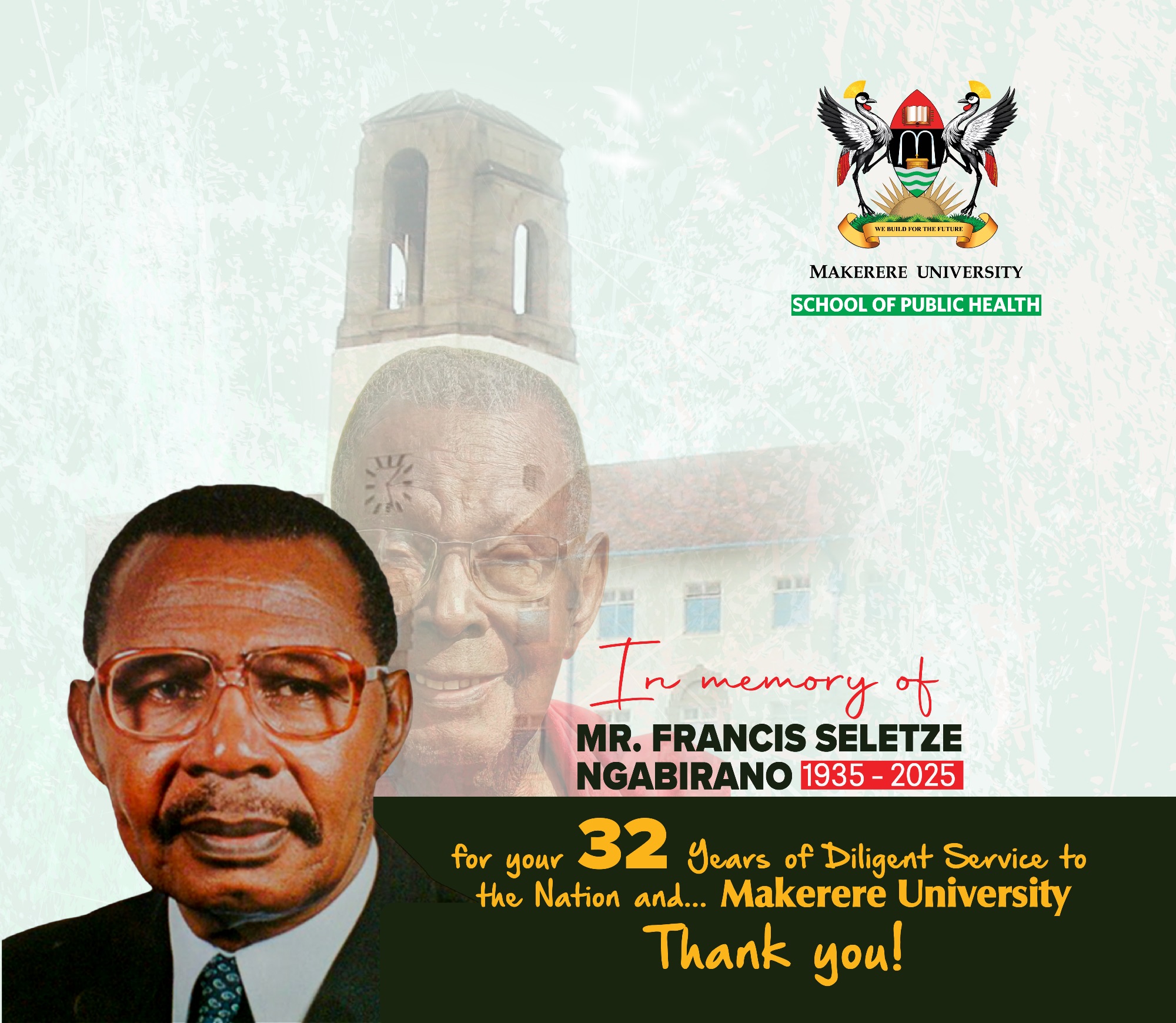
He strengthened his skills through further training in health education and public health administration at Kenyatta National Hospital, at the Hebrew University–Hadassah Medical School in Israel, and later at the University of Thessaloniki in Greece. These experiences gave him both global exposure and a strong command of public health systems, qualifications few Ugandans had at the time.
So, when he joined Makerere on 1 November 1968 as an Epidemiology Office Assistant, a role created specifically to accommodate his expertise, he arrived not as a beginner, but as a professional already shaped by years of responsibility.
As recorded in handwritten notes by Professor Suleiman Jabir Farsey on May 13, 1974:
“Mr. Ngabirano joined the Department in November 1968, and was appointed ‘Epidemiology Office Assistant.’ The records available in the Department indicate that Mr. Ngabirano was recruited for administrative duties, but because there was no provision in the establishment for such a post at the time, the post of Public Health Nursing Instructor was altered to one of Epidemiology Office Assistant,” wrote Professor Farsey, then Head of the Department of Preventive Medicine (1968–1975).
Becoming the Institutional Backbone
The early Institute of Public Health (IPH) was a small but ambitious unit within the Faculty of Medicine. It was led by Prof. Jabir Farsey as a Department of Preventive Medicine and supported by pioneering Ugandans such as Dr. Josephine Namboze, Dr. V. L. Ongom, Mr. S. K. Lwanga, Dr. M. L. Kakande, and Dr. B. Baitera. Behind this frontline of academics was a steady force, administrators like Mr. Ngabirano, making sure that teaching, research, and community outreach worked without disruption.
It is worth noting that Mr. Ngabirano witnessed the birth and transformation of the Department of Preventive Medicine into the first Institute of Public Health in Sub-Saharan Africa on 1 July 1975. The Institute was still under the Faculty of Medicine, then headed by Professor Joseph Lutwama, with Professor Jabir Farsey as its first head. Ngabirano also saw the construction of the four-story building that now houses MakSPH, completed in January 1971, along with the installation of furniture and essential facilities.
From his personal account, the idea of establishing an Institute had been conceived as early as 1967. However, the rise of Idi Amin delayed these plans and triggered the departure of remaining expatriates, including Dr. George Saxton, an American who had directed Kasangati Health Centre and taught in an honorary capacity in the Department of Preventive Medicine. Dr. Saxton, after a brief visit to Europe, returned with an aid package secured from the governments of Denmark and Norway, the funding that ultimately made the current MakSPH building possible. Saxton understood that creating an Institute required space, as staff and students had been cramped in the Clinical Research Building.
All these years, Ngabirano managed everything: financial records, planning epidemiological field tours, supervising personnel, coordinating WHO projects, handling stores and vehicles, and doing so with a thoroughness colleagues would later describe as his trademark.
Over the years, five heads of the Institute came and went: Prof. Jabir Farsey (1968-1975), Prof. Capt. Dr. Virginio Lachora Ongom (1975-1979), Prof. Josephine Namboze (1979-1988), Prof. John Tuhe Kakitahi (1988-1991), and Prof. Gilbert Bukenya (1991-1994), later replaced by Prof. Frederick Wabwire-Mangen (1995-2003). Directors changed, structures shifted, crises erupted… but Ngabirano remained.
His desk was where continuity lived.
A Witness and Chronicler of Turbulent Decades
Many people who lived through Uganda’s chaotic 1970s chose silence. But Mr. Ngabirano documented. His unpublished 1995 manuscript, The Institute of Public Health Through Idi Amin’s Rule, is one of the most significant historical accounts of Makerere’s public health training during a time when institutional memory was at risk of disappearing.
His writing describes:
The early Amin years saw a mass departure of academic staff. Prof. Farsey resigned in 1975, and Prof. Ongom died suddenly in 1979. Tragic losses of colleagues, Dr. Baitera, Dr. Kakande, and Mr. Asaba, further strained morale. Low salaries and dwindling staff eventually led to the discontinuation of the Diploma in Public Health in 1988.
These were not just institutional events; they shaped people’s lives. They tested loyalty, purpose, and endurance. Through all this, the Institute survived because of administrators who refused to let the vision fade. Few stood more firmly in that resolve than Mr. Ngabirano.
The Administrator Who Kept People First
His influence is most vividly remembered in the 1990s with the introduction of the two-year Master of Public Health (MPH) Degree Full-time Programme based on the concept of a Public Health Schools Without Walls (PHSWOW).
With support from the Rockefeller Foundation, this innovative model took training into district health systems; Rakai, Hoima, Fort Portal, Arua, Karamoja, Mukono, immersing students in real public health challenges. Administration for such a programme required: diplomacy, logistical mastery, pastoral care, financial stewardship, and calm leadership across diverse teams. Mr. Ngabirano excelled in every one.
Prof. Fred Wabwire-Mangen, then Director of IPH, remembers him as:
“A focused and organised administrator… the typical administrator of the olden days. He documented every detail clearly and ensured medical student fieldwork ran smoothly.”
Prof. Nazarius Mbona Tumwesigye, who joined when Ngabirano was already a pillar of the Institute, offers this reflection:
“He served the School diligently. The administrator was the engine of the Institute. Directors often travelled, but he ensured day-to-day affairs continued uninterrupted. He sustained this place when salaries were meagre and conditions extremely difficult.”
To young staff, he was not just a supervisor; he was guidance, stability, and care.
In 1993, a new graduate student, Professor Christopher Garimoi Orach, joined Makerere, encouraged by Prof. Gilbert Bukenya to pursue the Master of Medicine in Public Health (MMED PH). That programme would later evolve into the modern two-year MPH. One of the first people he encountered was Mr. Ngabirano.
Prof. Orach remembers him vividly and eulogises him:
“Francis Ngabirano worked with great dedication, commitment, and distinction at the Institute of Public Health. He was passionate about his work as an Administrator, humorous, smart, and ever-present. He interacted easily with faculty and students, always supportive. Rest thee well, Francis. You rendered your service admirably, with great love, passion, and honor. Rest now with the Creator, the giver and taker, in tranquility, in a place well prepared for you eternally.”
These words reflect the admiration of countless others whose paths he helped establish. To others, Ngabirano was a fatherly guide to future leaders. When Dr. Lynn Atuyambe arrived at the Institute in 1994, he was not yet the senior academic we know today but just a young researcher seeking footing.
He found in Ngabirano a mentor who understood people, not only processes.
“He participated in student welfare, was very kind and approachable. He allocated field vehicles, ensured our welfare, organised workshops, and kept strong links with our training centres. He had an art of storytelling with clarity and great detail, I will miss that.”
Dr. Atuyambe particularly remembers a life-changing personal moment:
“The first laptop in my life, he delivered it to me in the field and showed me how to use it. It was 1996. He was friendly and fatherly. May his soul rest in peace.”
These are not merely memories; they are bridges between generations. They tell the truth: the foundations of public health capacity building in Uganda were built not only by professors publishing papers but also by administrators who made classrooms, vehicles, housing, and field learning possible.
During the “MPH at 25” celebration on Oct. 16, 2019, he received a certificate from Vice Chancellor Prof. Barnabas Nawangwe recognizing his role in shaping 25 years of MPH training at Makerere University, an honour that followed his earlier Long Service Award from the University Council in 1995.
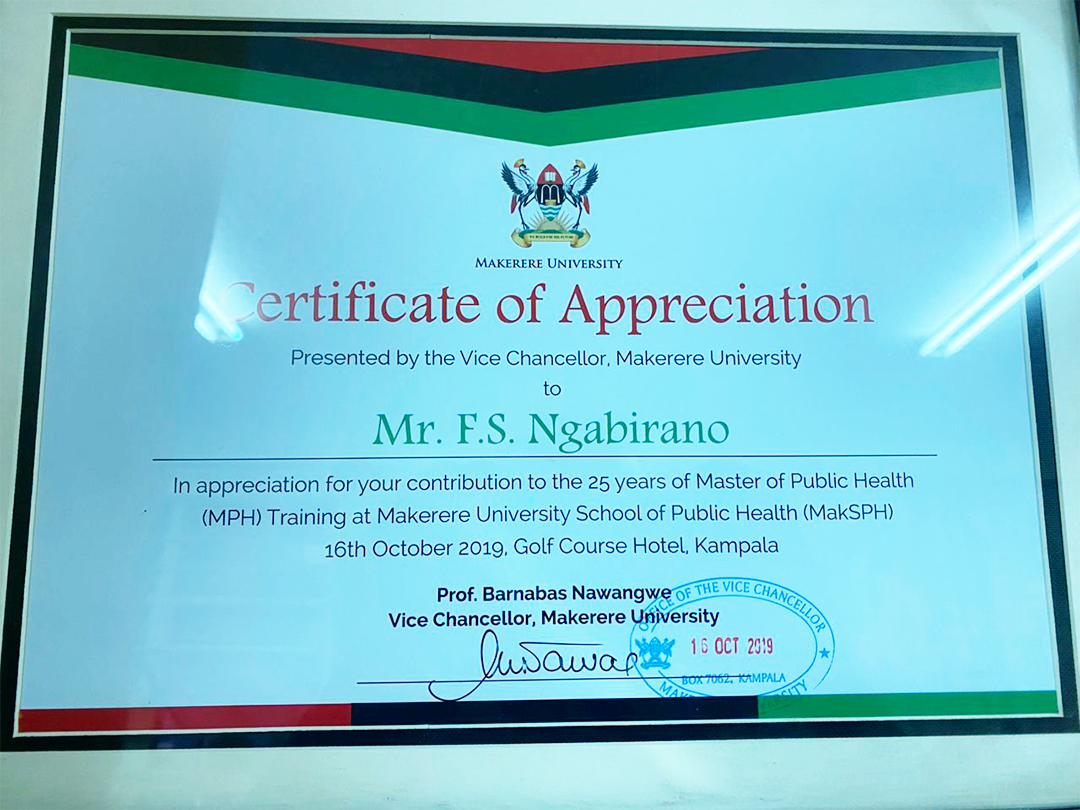
In 2024, Makerere University School of Public Health marked 70 years of existence. For almost half that history, 32 years, the institution was shaped, steadied, and propelled forward by Mr. Francis Ngabirano’s resolve.
Ngabirano’s legacy is woven into the School’s Story. He lived the mission before it became slogans; taking health training to communities, nurturing the next generation of public health leaders, staying when others left, building systems where none existed, documenting history so no one would forget. He is the man who didn’t seek applause. But his contribution is visible in every graduate who navigated the Schools without walls programme, in every field team he deployed safely, in every archived record that tells us where we started and how far we have come.
His retirement in the late 1990s closed an amazing chapter, yet he left behind structures still functioning, and people still carrying his values forward.
In institutions, some people shine in celebration. Others shine in crisis. Mr. Ngabirano shone in both and in his demise, the School of Public Health revere him as a gentleman who kept the School alive when it was hardest to stay.
He stood for diligence when resources were scarce, for continuity when the institution trembled, for service not as a role, but as a calling. We remember him not simply for what he did, but for who we became because he was here. He was the history-keeper, the stabiliser and the quiet guardian of a mission that outlived the hardest years.
And today, as we honor him, we also honor the courage it took to stay when leaving was easier.
To his family, his wife, Jane Ngabirano, and the children, Nina, Victoria, Justus, and Kenneth, thank you for sharing him with us. To his colleagues, thank you for walking the journey with him. To the generations he supported, your success is part of his legacy.
Mr. Francis Seletze Ngabirano’s life reminds us that greatness is not always loud. Sometimes, it is found in punctual footsteps, a carefully kept file, a well-organised field trip, a story told at just the right moment, and the choice, every morning, to keep serving.
May he rest in peace, knowing that his work mattered.
And may the institution he helped carry forward always carry his name in its story.
Trending
-
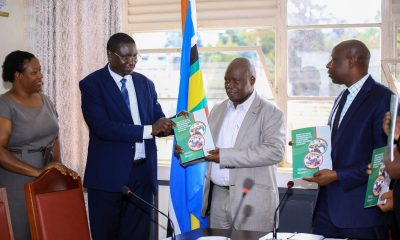
 Research2 weeks ago
Research2 weeks agoMakerere University and Ministry of Public Service Study Reveals Impact of Salary Enhancement on Teacher Performance in Uganda
-
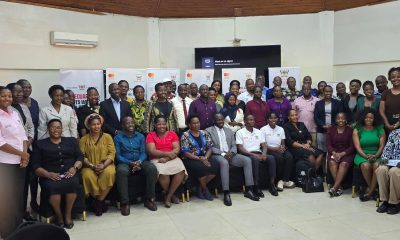
 General1 week ago
General1 week agoMakerere University officially commences implementation of its Mentorship Policy
-
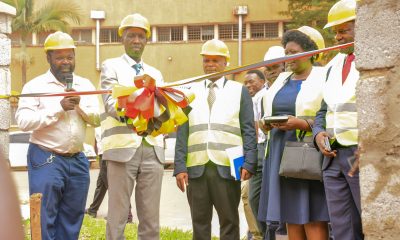
 Education2 weeks ago
Education2 weeks agoReal life project: Makerere University Vice Chancellor hands over constructed Wall Fence to Makerere College School
-
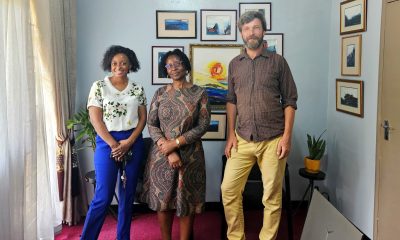
 Engineering, Art & Tech3 days ago
Engineering, Art & Tech3 days agoErasmus Exchange Prof.’s Mak Photo wins Poland National Prize
-
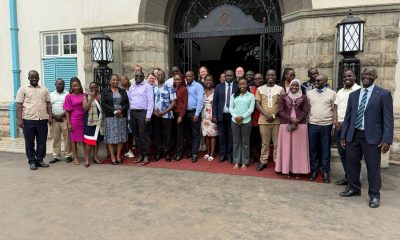
 Agriculture & Environment1 week ago
Agriculture & Environment1 week agoStrengthening Capacity and Shaping Policy: Makerere University Reviews Progress of MERIT and Environmental Risk Research Programs
